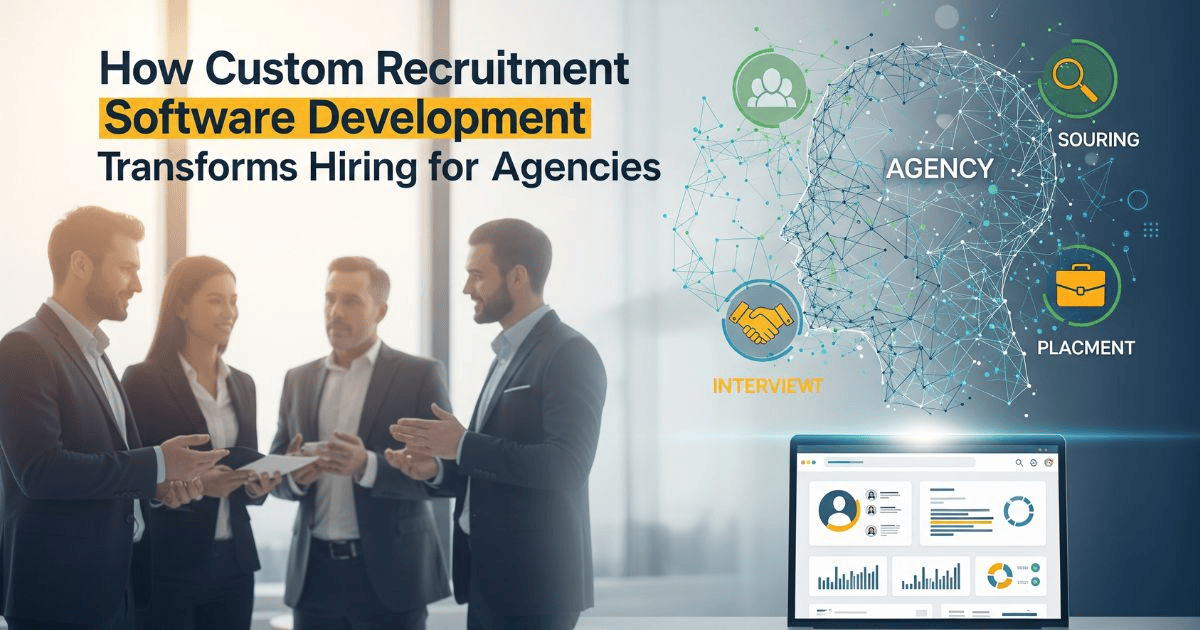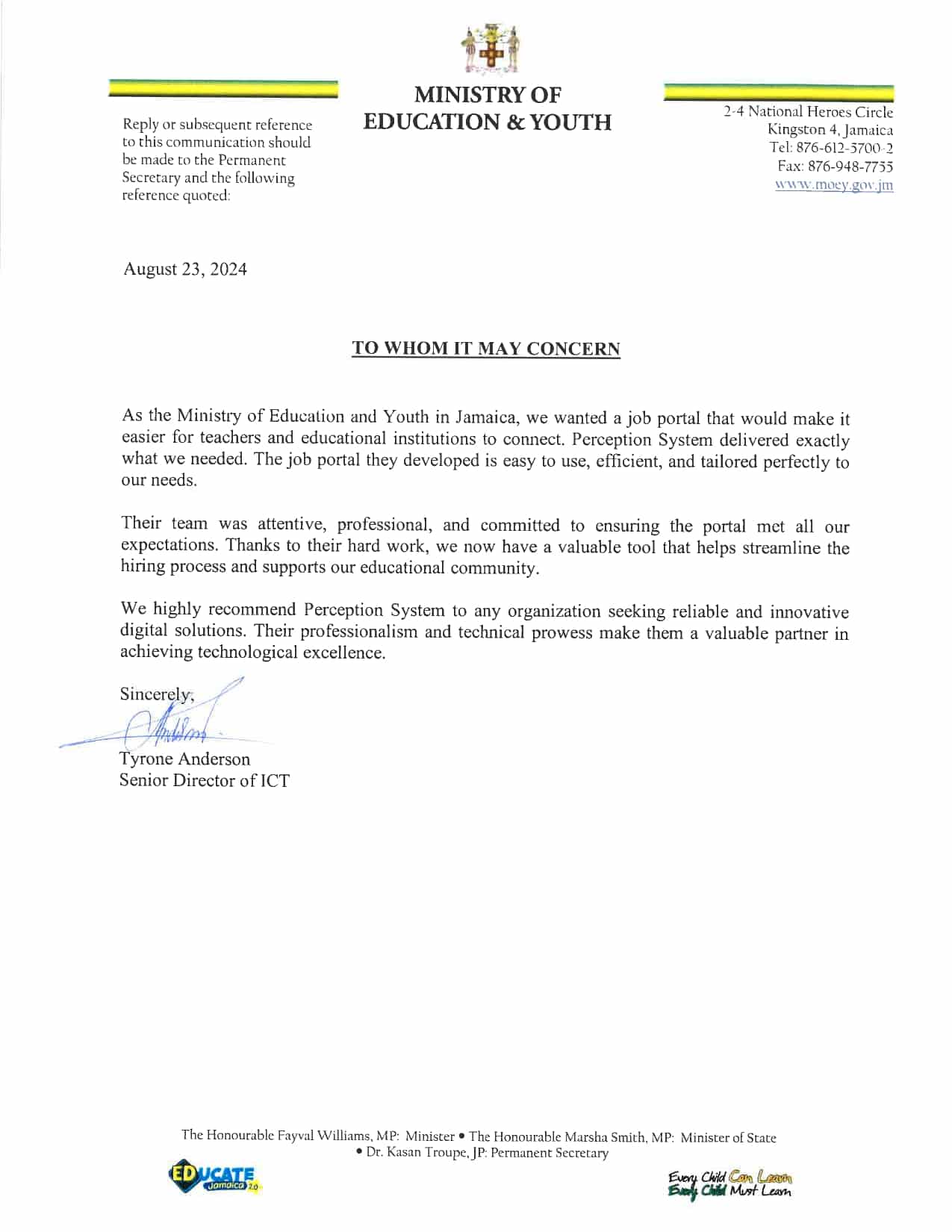Table of contents:
The Shift from Manual Hiring to Intelligent Automation Why Agencies Are Choosing Custom Recruitment Software Inside the Development Process
Discovery & Requirement Analysis
UX/UI Design
Core Development
Integration & Testing
Deployment & Maintenance
Applicant Tracking System (ATS)
AI-Powered Resume Parsing
Smart Matching Algorithm
Recruitment CRM
Multi-Channel Job Posting
Interview Scheduling & Calendar Sync
Analytics Dashboard
Compliance & Security
Recruitment has changed more in the last five years than it did in the last two decades. Between remote work, candidate experience, and data-driven hiring, staffing agencies now depend on smart technology to stay competitive. Off-the-shelf tools can only take you so far; custom recruitment software development is what’s really reshaping how agencies attract, evaluate, and hire top talent.
In this blog, we’ll dive deep into how custom recruitment systems are built, what features matter most, and why they’re a game-changer for agencies of all sizes.
The Shift from Manual Hiring to Intelligent Automation
Recruiters used to rely on Excel sheets, job boards, and email threads to manage candidates. Fast forward to today, and agencies need a complete Recruitment Management System that automates everything from sourcing and screening to onboarding.
A custom recruitment software solution does exactly that. It integrates seamlessly with existing workflows, syncs with job portals, and provides real-time analytics that make hiring faster and smarter.
Why Agencies Are Choosing Custom Recruitment Software
Every agency has its own hiring process. Some focus on high-volume placements, while others handle niche technical hiring. Pre-built tools often fall short when it comes to unique workflows or integrations. That’s where custom recruitment software development comes in.
Here’s why agencies prefer building their own platforms:
1.Tailored Workflows: Design the system around your exact hiring stages with no forced templates.
2. Scalability: Add new modules (like ATS or CRM) as your business grows.
3. Automation: Automate repetitive tasks such as resume parsing, candidate shortlisting, and follow-ups.
4. Data Ownership: Keep control of your candidate database with no third-party dependency.
5. Integration: Sync with job portals, HR tools, and communication platforms effortlessly.
When designed right, your software becomes a core business asset, one that boosts efficiency, reduces time-to-hire, and enhances client satisfaction.
Inside the Development Process
At Perception System, we’ve built multiple custom hiring platforms, from recruitment CRM software to online recruitment systems. The process follows a proven structure to ensure scalability and performance.
1. Discovery & Requirement Analysis
It starts with understanding the client’s recruitment challenges and business goals. Do they need a full recruitment portal development solution or a lightweight talent acquisition system?
2. UX/UI Design
User experience plays a major role. The interface should feel intuitive to recruiters, with dashboards for job postings, candidate pipelines, and reporting tools.
3. Core Development
Using modern tech stacks, we build modules like:
- Analytics & Reporting
- Applicant Tracking System (ATS)
- Candidate Management
- Job Posting Automation
(For clients needing deeper automation, we also offer ATS Software Development Services.)
4. Integration & Testing
Integration with third-party platforms LinkedIn, Indeed, or internal CRMs is tested thoroughly for reliability and speed.
5. Deployment & Maintenance
Once live, the system undergoes continuous optimization and updates based on recruiter feedback.
Case Insight: Building a Simple Job Portal for Seamless Hiring
A great example of this process in action is our Simple Job Portal Website Development Case Study.
Our client needed a platform to connect job seekers with employers faster. We built a custom recruitment portal with advanced filters, admin dashboards, and candidate tracking features. The result?
- 60% faster candidate placements
- 40% increase in recruiter productivity
- Higher retention due to better matching algorithms
This shows how tailor-made recruitment solutions don’t just digitize hiring they transform it.
Key Features of an Effective Recruitment Software Solution
A well-built recruitment automation software isn’t just about managing candidates it’s about empowering recruiters. Here are the must-have features that define enterprise-grade recruitment systems:
1. Applicant Tracking System (ATS): Centralised database to track candidates from application to onboarding.
2. AI-Powered Resume Parsing: Automatically extract candidate skills, experience, and education.
3. Smart Matching Algorithm: Matches job requirements with candidate profiles using AI.
4. Recruitment CRM: Builds and maintains relationships with clients and candidates.
5. Multi-Channel Job Posting: One-click posting to LinkedIn, Indeed, and internal portals.
6. Interview Scheduling & Calendar Sync: Keeps recruiters and candidates on the same page.
7. Analytics Dashboard: Visual reports on time-to-hire, source efficiency, and recruiter performance.
8. Compliance & Security: GDPR-ready and secure to handle sensitive candidate data.
If your agency deals with both client communication and candidate engagement, consider integrating Recruitment CRM Software Development to build long-term value.
Benefits of Recruitment Software for Staffing Agencies
Let’s break down what custom software can actually do for your agency:
- Reduce Time-to-Hire: Automated screening and scheduling speed up recruitment cycles.
- Enhance Candidate Experience: Personalised communication and transparent tracking.
- Better Data Insights: Access to detailed hiring metrics that support smarter decisions.
- Cost Efficiency: Cut dependency on external job boards and SaaS subscriptions.
- Scalable Growth: Add new features as your team expands or your niche changes.
When done right, the ROI on a recruitment platform easily outweighs the upfront development cost.
Technology Stack for Recruitment Software Development
A high-performing recruitment management system depends on the right tech stack. Here’s what’s commonly used:
| Component | Recommended Technologies |
| Frontend | React.js, Angular |
| Backend | Node.js, .NET Core, or Laravel |
| Database | MySQL, PostgreSQL, MongoDB |
| Cloud/Hosting | AWS, Azure, Google Cloud |
| APIs & Integrations | REST APIs, GraphQL |
| Automation Tools | AI/ML, NLP for candidate matching |
Using these tools, agencies can create flexible, future-ready recruitment ecosystems.
Choosing the Right Development Partner
A recruitment software project needs a team that understands both HR tech and software architecture. Whether you’re building from scratch or upgrading your system, working with an experienced Recruitment Software Development Company ensures success.
At Perception System, we specialise in building end-to-end digital hiring platforms, from web portal development services to mobile-first recruitment apps. Our experts combine technical precision with domain expertise to deliver scalable solutions for agencies worldwide.
If you’re ready to modernise your hiring process, our team can help plan and develop a system that fits your agency’s unique workflow.
Contact Us to get started.
FAQs on Recruitment Software Development
1. How much does recruitment software development cost?
It depends on your project scope and features. A basic recruitment portal may start around $10,000, while enterprise-grade systems with AI and CRM modules can cost $40,000–$100,000+.
2. What are the key benefits of recruitment software for staffing agencies?
Automation, faster hiring, better analytics, and improved candidate experience—all leading to more placements and higher ROI.
3. What features should I include in my recruitment management system?
Core modules like ATS, CRM, resume parsing, interview scheduling, analytics, and integrations with major job boards.
4. Is it better to build or buy recruitment software?
Buying works for small teams. But for growing agencies that want control, branding, and flexibility, custom development is the smarter investment.
5. What makes Perception System the best recruitment software development company in the USA?
Years of experience, a proven track record, and tailored solutions designed to scale with your business.
Final Thoughts
Recruitment isn’t just about filling positions; it’s about connecting people and opportunities efficiently. With custom recruitment software development, agencies can automate tasks, streamline communication, and make hiring more human.
If your agency is still juggling spreadsheets or disconnected tools, now’s the time to invest in a unified solution that grows with you.




